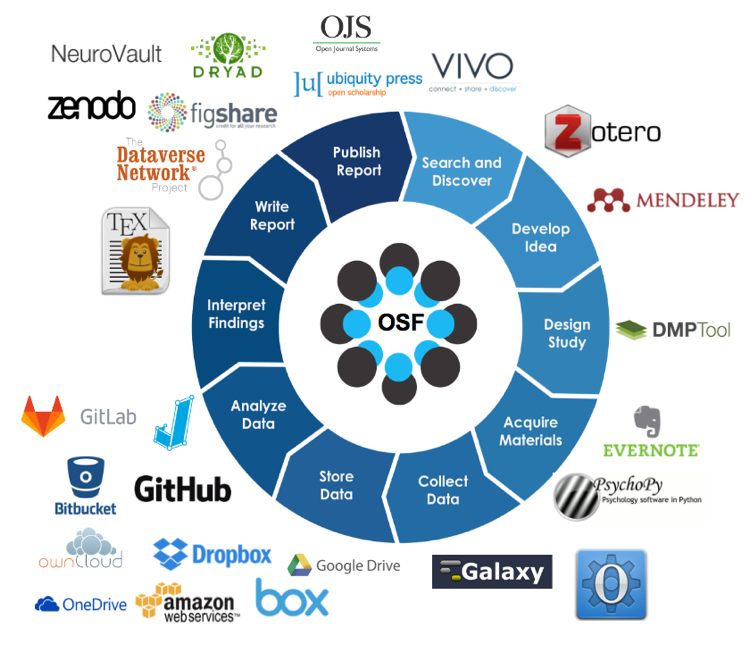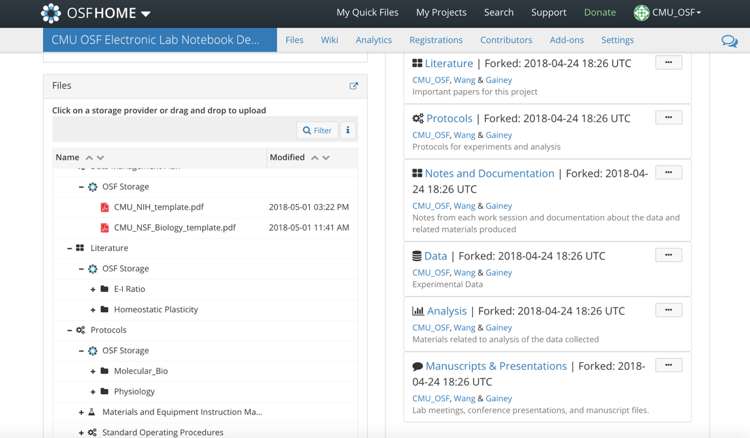Open Science Framework is a free and open source tool that can be used for managing projects and collaborations in any discipline. OSF is a great way to keep track of all of the different files that are part of a complex research project. You can store files directly on OSF cloud storage (unlimited number of individual files that are under 5 GB each) or sync popular third-party applications such as Google Drive, Box, Dropbox, Amazon S3, GitHub, figshare, Mendeley, and Zotero to the project. You can add collaborators from CMU or anywhere else to a project and set their access so that they can view or edit parts of a project. You can also use OSF to share your work publicly so that it can be cited. Overall, it's a powerful tool for research management, documentation, and collaboration that can help you see the sum of your work across many different platforms.

Open and reproducible science
Developed by the non-profit, Center for Open Science, OSF has a number of features that support open and reproducible research. There are many reasons to practice more open research including so that others can more easily discover, reproduce, or reuse parts of your work and cite them, so there is added transparency in how you conducted research or found results, and so that you yourself can remember exactly what you did when you need to recreate an analysis later. OSF allows users to publicly share entire projects or parts of projects, assign them a permanent Digital Object Identifier (DOI) and select an appropriate license for reuse. You can also use the platform to preregister or register a study to publicly demonstrate your plans for the work at different time points. OSF Preprints allows you to post preprints of work as unpublished and non-peer-reviewed manuscripts, to share your work quickly ahead of publication.
Creating a project in OSF
You have a lot of control over both the structure and privacy settings of a project in OSF. Each project has an editable wiki and a flexible hierarchical structure comprised of components, folders, files, and add-on services. One way of organizing a project is to have components that reflect the different phases of the research workflow, as shown below. Each component in an OSF project can have its own privacy settings, license, and DOI. Add-on apps will not be visible on public projects, so any files that you want publicly shared should be stored directly on OSF storage. A project can be private, public, or shared with collaborators (called "contributors" on OSF). Each component can be individually cited with a DOI and can be given a specific license to determine how others can use it, for exactly CC-BY if you want to be cited or CC-0 for data that you want to be used freely.

Collaboration
Need any easy way to share files stored locally and on the cloud with collaborators? OSF is useful for managing collaborations with other members of your research group or with others at CMU and beyond. A contributor to an OSF project can have administrator, read & write, or read only privileges. If a collaborator does not have an OSF account, you can add them as an unregistered contributor. Each component can have its own unique contributor permissions.
Data Management
Research data should always be stored in three places, including one remote or cloud location. If you don't currently have your data stored on the cloud, you might consider using OSF storage for files under 5 GB. Other commonly used cloud storage services such as Google Drive, Box, Dropbox, and Amazon S3 can be synced to OSF. Note that CMU-specific storage options that you log in to with your Andrew ID can be added to OSF: G Suite is currently available for linking and Box linking capability will be available soon.
You can also protect against unexpected data loss with OSF's built-in version control. Any text-based file can be edited directly in OSF and will be saved as a new version. You can see in your project, which collaborator made changes and when. When you add a new version of a file with the same name to the project, it will be automatically saved as a new version. You can also access previous versions of files stored on synced third-party applications.
To get started with OSF
In June of 2018, the CMU Libraries will be launching an institutional license for OSF that will allow researchers to use Shibboleth Single Sign-On to access their accounts with their Andrew IDs. Users will then be able to sync their CMU Box accounts to their OSF accounts. A public landing page for OSF at CMU will showcase public projects from CMU researchers.
In the meantime, you can use your CMU email address to create an account and can sync all other third party applications to your account. If you would like help getting started with OSF, you can contact the library, refer to our Research Guide, or attend our upcoming University Libraries workshop.
If you already have an OSF account, either with your CMU email address or any other email address, OSF will send you a notification of the CMU Institutional subscription this summer and you will be given the option to migrate your account to login with your Andrew ID. This will then allow any of your public projects to be discovered on the CMU OSF landing page.
Workshop: Getting Started with Open Science Framework
June 28th, 2018
10:30am to 12:00pm
Location: Hunt Library, IDeATe Studio B,
Register: https://cmu.libcal.com/event/4227422
By: Melanie Gainey and Ana Van Gulick
